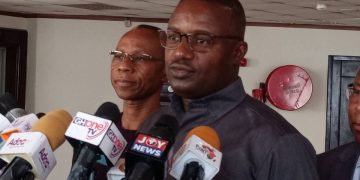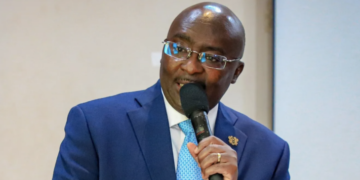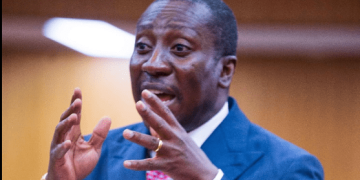President Nana Addo Dankwa Akufo-Addo has urged member states of the Gulf of Guinea Commission (GGC) to reconsider how the organisation has operated over the last 23 years.
He said reevaluating the commission’s approach would maximise the region’s vast maritime resources, ensure security and sustainable blue economy development, improve state and regional stability, and make it more relevant to the GGC’s geopolitics.
“A rejuvenated Commission is essential to our collective pursuit of peace, security and stability in our respective countries,” the president said in a speech read for him by the Defence Minister, Dominic Nitiwul, at the opening of the 6th Ordinary Session of the Assembly of Heads of State and Government of the Gulf of Guinea Commission in Accra on Tuesday.
The Session was being on the theme “Building a Secure and Prosperous Gulf of Guinea Region for Sustainable Development.”
It aimed to assess the work of the GGC and propose measures for enhancing its overarching objective of cooperation among the States of the Gulf of Guinea region and the transformation of the sub-region into a zone of peace, security, and sustainable development.
President Akufo-Addo stated that, while the Commission’s initial revitalisation efforts had generated promising results, it was still a long way from meeting its goals, especially given the persistent challenges to security and resources in the Gulf of Guinea.
Thus, it was imperative for all concerned nations to build their capacities through strengthened cooperation and enhanced information sharing among countries bordering the Gulf of Guinea, he said, adding, “Let me state that no single country can address independently the multiplicity of evolving maritime threats within their territorial waters.”
The president, who also serves as the commission’s chair, stated that the GCC’s expansion can only take place if the Commission’s Treaty is amended to include all coastal states from Cape Verde to Angola.
He urged countries in the Gulf of Guinea region that had previously expressed interest in joining the bloc but had not followed through to do so for the good of the region’s overall marine security.
“Ladies and gentlemen, it is incumbent upon us to make the organisation more attractive, relevant and capable of meeting the expectations of the prospective Member States regarding their interest in the Gulf of Guinea Commission…This can be achieved through advocacy and various activities and programmes that demonstrate the Commission’s potential and capabilities,” he said.
President Akufo-Addo also urged his counterparts to find acceptable ways to support the Commission, as this was critical to the GGC’s success and longevity.
He said the recent trend in Member States’ payment of assessed contributions, along with the Commission’s expanding mandate, showed that continued total dependence on Member States for funding was unsustainable in the medium to long term.
“Once again, the Executive Secretariat is called upon to take necessary steps to identify alternative sources of funding for the organization,” he said.
The president asked the Commission to use technology to achieve relevance, dynamism, and appeal while also transforming the fortunes of the Gulf of Guinea region.
“Excellencies, our world is no longer stagnant. In this age of technology, we witness rapid transformations in all aspects of our lives. It is no longer prudent to be fixated on old ways of doing things. It is also precarious to remain indifferent to the fast-paced transformations occurring around us,” he stressed.
President Akufo-Addo urged all member states of the organisation to demonstrate greater political commitment at the highest level of government by attending all statutory meetings at all appropriate levels.
“Such collaborative interactions would ensure co-ownership of initiatives and enhance innovative approaches to tackle the security challenges and threats to maritime security in the Gulf region.
“Excellencies, collaboration and cooperation among the States of the region are vital due to the interconnected nature of the maritime activities, which necessitates our working together to build a state-secured and prosperous Gulf of Guinea region for sustainable development,” he said.
The commission’s executive secretary, Jose Mba Abeso, highlighted the Gulf of Guinea’s vast resources and potential, as well as its enormous challenges and prospects.
He observed that since its last summit, the commission had made considerable progress in maritime safety, combating illegal fishing, and environmental protection, and urged member states to support and collaborate to build a safer and more prosperous Gulf of Guinea.



















































































